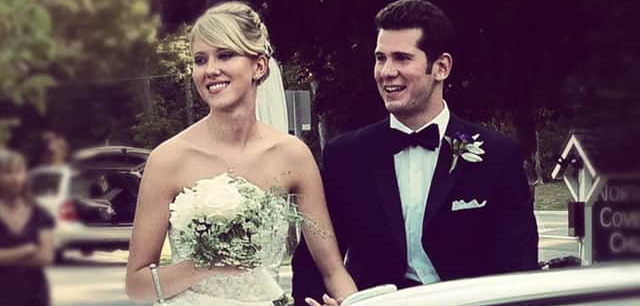Last week, a video went viral of popular conservative commentator Steven Crowder, a professing Christian, verbally abusing his ex-wife, Hilary Crowder. Hilary’s family released the three-minute clip to clarify Steven Crowder’s claims that Hilary divorced him for no reason.
In the video, Hilary Crowder, who was eight months pregnant with twins, was trying to leave the house after a conflict over giving medication to the dog. Hilary didn’t want to administer it in case touching it proved toxic to their unborn babies. And Steven, while smoking a cigar on the patio, insisted she do so while wearing gloves.
During the conversation, Hilary exhibited fawning behavior, a trauma response common in abusive situations, where one remains calm and speaks quietly to try to de-escalate. She kept assuring her husband she loved him and was committed to him, while also trying to escape.
“She kept assuring her husband she loved him and was committed to him, while also trying to escape.”
Steven, on the other hand, berated his wife for not doing “wifely things” and questioned whether she was “worthy” of being a wife. He told her she needed more “discipline and respect.” He complained that if she took the car, he wouldn’t be able to leave the house, and then what would he do?
But most of all, he kept repeating she wasn’t respecting him and wondered if she had ever shown any respect for men at all. He berated her, yelled at her and swore at her —and after the video ends apparently followed her into the house and threatened to “f*** her up.”
In conversations online about the video, even many Christians are denying that this behavior is abusive. There was no physical violence, after all, they say. It seemed like a normal fight.
If this is normal for Christian relationships, we’re in a lot of trouble.

Steven Crowder
What is the evangelical definition of ‘respect’?
Let’s dissect Steven Crowder’s main argument to understand why many may not recognize the abuse. His main concern was her lack of respect, which was odd, because she actually was being exceedingly respectful. She did not raise her voice, insult him or belittle him. She was not passive aggressive. She stated her boundaries clearly but also repeatedly declared she loved him and was committed to him. She volunteered to pick up the shopping items he was concerned about.
“His main concern was her lack of respect, which was odd, because she actually was being exceedingly respectful.”
How, then, could Crowder accuse his wife of being disrespectful?
Likely because he was defining respect the way far too many in the conservative evangelical community do. While most of us consider speaking respectfully as the dictionary defines it — with “due regard for the feelings, wishes, rights or traditions of others” — Christian marriage resources often mean something entirely different.
Love and Respect, by Emerson Eggerichs, is one of the most commonly used marriage curricula in North American churches and has popularized the idea that men desperately need respect while women desire love. This book, which has sold more than 2 million copies, defines the respect husbands are owed using the acronym CHAIRS: (my summary in italics):
C — Conquest: I recognize and thank him for his desire to work — because men’s natural place is in the workforce; women’s natural place is at home.
H — Hierarchy: I thank him for his motivation to protect and provide for me — because marriage is a hierarchical relationship.
A — Authority: I acknowledge his desire to lead and don’t subvert his leadership —because the husband is in charge.
I — Insight: I listen appreciatively to his ideas and the advice he wishes to offer — because women are susceptible to deception, so should trust their husbands instead of themselves.
R — Relationship: I value his desire for me to be his friend and stand shoulder-to-shoulder with him — because a woman can’t expect her husband to enjoy just talking to her.
S — Sexuality: I respond to his needs sexually; I don’t deprive him — because men need “physical release” while women do not.
Reading Eggerichs’ sex chapter in Love and Respect was the impetus for our book The Great Sex Rescue, based on our survey of 20,000 predominantly evangelical women. In that chapter, he framed sex as about a husband’s physical release; left intimacy out of the equation; and never mentioned that a wife could and should feel pleasure too. (See our scorecard that breaks down why Love and Respect scored 0/48 on our healthy sexuality rubric).
“When she questions his decisions, she disrespects him and dishonors his place in the family.”
But let’s leave sex and focus instead on what Hilary Crowder would learn if she read Love and Respect about hierarchy, authority and insight. She would hear that her good-willed husband’s deepest desire is to protect her, even if she doesn’t always see it. When she questions his decisions, she disrespects him and dishonors his place in the family. When she expresses an opinion, objection or even disappointment, she can violate the structure of the marriage. He, on the other hand, has the ability and right to label anything he doesn’t like as disrespectful.
That’s exactly what Eggerichs does in Love and Respect. His wife reminding him to stop leaving wet towels on the bed and candy wrappers on the floor? Disrespectful. (p. 243). His wife feeling upset because he forgot her birthday? Disrespectful. (p. 12).
It’s not much of a leap to: An eight-months-pregnant-with-twins wife not wanting to give the dog medicine in case it endangers the babies? Disrespectful.
So what is Hilary to do? Basically nothing. Over and over again, instead of showing how wives can make their needs or opinions known, Eggerichs quotes 1 Peter 3:1-4, encouraging women to be gentle and quiet and “win him without words.”
Her words are a problem. Her opinions are a problem. Her expectations that they achieve real intimacy are a problem.
“Who is the real problem? She is, because she isn’t deferring to him.”
She is a problem.
And that’s how Steven Crowder framed the interaction. He may be the one relaxing with a cigar while his pregnant wife is trying to tend to their responsibilities; he may be the one berating her, yelling at her, threatening her. But who is the real problem? She is, because she isn’t deferring to him.
Whose responsibility is it to fix an abusive marriage?
OK, but surely that advice would change if we were dealing with an abusive situation, right? Not so fast.
Although Eggerichs gives lip service to escaping a physically abusive marriage, he still frames the long-term solution to abusive dynamics as the wife unconditionally respecting the husband. A man repents of his physical and verbal abuse, and how is the marriage improved?
“She began showing him respect, mostly by remaining quiet and dignified instead of arguing.” (p. 278).
Another man is released from serving a jail sentence for abuse, and after he repents, Eggerichs praises the wife’s letter to him, because “she said absolutely nothing about the abusive incident” and committed to unconditionally respecting her abuser (p. 84).
“Even if a husband doesn’t repent, the solution still lies with the wife.”
Even if a husband doesn’t repent, the solution still lies with the wife. When Eggerichs talks about his own parents’ marriage, where he witnessed his father strangle his mother, he praises his mother for not being a victim.
He says, “My father would become enraged at my mother. … He would take offense at things my mother innocently did and then explode.” (p. 283) — just as Steven Crowder did.
Yet what does Eggerichs suggest a woman do in this situation? Emulate his mother, who “made a choice to be positive. She knew if she could discover creative alternatives to the conflict, she would never believe for a moment she was helpless and hopeless.”
He never mentions that once a man strangles his wife, he is seven times more likely to kill her.
At the very end of his book, Eggerichs quotes a woman, whose story bears a remarkable resemblance to Hilary’s, explaining: “His rage is withering and makes me want to get away and hide.” (p. 283). What is Eggerichs’ advice?
Look at what you are doing wrong and give unconditional respect no matter what. In other words: Let him be in charge; defer to his leadership; follow his insight; give him sex on demand. The answer to his rageful emotional abuse is to be quieter, be more compliant, make yourself smaller.
It’s to do exactly what Hilary Crowder did.
This advice not only enables abuse; advising people to ignore their opinions and needs and make themselves smaller is abusive in and of itself.
“Advising people to ignore their opinions and needs and make themselves smaller is abusive in and of itself.’
A woman like Hilary Crowder will not find help in many of our evangelical bestselling marriage resources; she will simply hear that she is the problem.
Perhaps it’s no wonder, then, why so many Christians couldn’t see the Crowder video as abuse. It merely mimics what our Christian resources consider normal marriage dynamics.
We must care about the effect this advice has on people in destructive marriages.
It could be that Love and Respect helped your marriage, because you are both decent people who would never take it that far. But in our survey of 20,000 women, it was the most named resource that harmed women’s marriages. It may have helped you, but what if your sister is like Hilary Crowder? What if your best friend is married to a man like Steven Crowder?
Next time you want to teach about how men need respect, don’t picture a man who merely wants his efforts to be appreciated. Picture instead Steven Crowder, who believes he is entitled to absolute deference, even from an eight-months-pregnant-with-twins wife when his request might endanger the children.
Let’s instead teach the words of Jesus:
Jesus called them together and said, “You know that the rulers of the Gentiles lord it over them, and their high officials exercise authority over them. Not so with you. Instead, whoever wants to become great among you must be your servant, and whoever wants to be first must be your slave — just as the Son of Man did not come to be served, but to serve, and to give his life as a ransom for many.” (Matthew 20:25-28).
Those words are for everybody. Even men. Even husbands. Even Emerson Eggerichs and even Steven Crowder.
Download our one-sheet report summarizing the problems with the book Love & Respect.

Sheila Gregoire
Sheila Wray Gregoire is the founder of BareMarriage.com, and the author of nine books, including The Great Sex Rescue and most recently She Deserves Better: Raising Girls to Resist Toxic Teachings about Sex, Self, and Speaking Up.
Related articles:
Preston Sprinkle’s strange interview with Sheila Gregoire and Rebecca Lindenbach | Analysis by Rick Pidcock
The Great Sex Rescue throws a lifeline to evangelical women
How to talk with your kids about porn without sending them straight to hell | Analysis by Rick Pidcock
Can pastors please stop salivating over women’s bodies in sermons? A response to Jonathan Pokluda’s objectification of the ‘perfect’ woman | Opinion by Shiela Gregoire
Do conservative evangelicals enjoy better sex and marriage? A response to Josh Howerton
Meet the Theobros, who want you to know they’re right about everything

